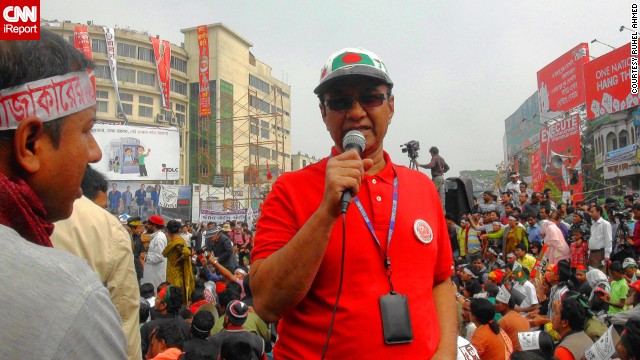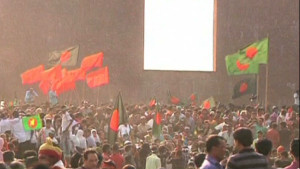Join the conversation
March 28, 2013 -- Updated 1330 GMT (2130 HKT)

Ruhel
Ahmed, from Austin, Texas, joined protesters in his native Bangladesh.
"My lifelong dream has been to go back ... and see that justice is
done," he said.
STORY HIGHLIGHTS
- What was an American doing in the midst of an intense protest in Bangladesh?
- Ruhel Ahmed is a veteran of the 1971 war at the heart of Bangladesh demonstrations
- He has been in the U.S. for a few weeks, but plans to return soon for several months
To understand the answer, you have to go back a few years in Ruhel Ahmed's life.
At 18, he was a
student-turned-guerilla freedom fighter wounded in action in the 1971
independence war -- a war that started 42 years ago to the week. Earlier
this year, he returned to the homeland where he fought, weaker, but
still strong at heart, and inspired by what he has seen. This
demonstration is personal for the solar technician from Austin, Texas.
"There's an unfinished
job of trying the war criminals," said Ahmed, who was in Dhaka on
business when the demonstrations started in February. He joined as
quickly as he could, camera in hand, documenting his experiences along
the way for six weeks.
"I was here for 20 years
in America. Now that my family is settled and my kids have grown up, my
lifelong dream has been to go back to Bangladesh and see that justice is
done. The time has come now," he said.
 Protests in Bangladesh over war crimes
Protests in Bangladesh over war crimes
The Shahbag protests,
named after a Dhaka neighborhood, center on that brutal nine-month war
in which Ahmed and other Bangladeshis fought for independence from
Pakistan. When one of the top officials in the opposition
Jamaat-e-Islami party, Abdul Quader Mollah, was sentenced to life in
prison for war crimes on February 5, protesters demanded a death
sentence. (Since then, violence has escalated as other war criminals received death sentences, and Jamaat supporters launched counterprotests.)
During Ahmed's time in
Bangladesh, he would spend about six hours a day among the protesters,
as they shared their stories about why they were there. He encountered
many among the hundreds of thousands in the crowd who shared the
protests with the world via social media, all the while knowing they
could be in danger. Ahmed himself said he is willing to die for the
cause.
Dozens have been killed
in incidents related to the protests since February. "One of the
bloggers I met spent the day talking to me. The next day he was chopped
in pieces."
On March 8, Ahmed was documenting the protest with his camera when chaos erupted.
Three Molotov cocktails were tossed from a five-story building,
allegedly by supporters of Jamaat. "Everybody panicked," he said.
"One of the speakers at
the demonstration said, 'Our parents were not afraid in 1971; we won't
be afraid now,'" according to Ahmed. "Within 30 seconds, everyone sat
down and started chanting slogans."
Of course, scenes of
large protests have become more common in recent years, with varying
results. When he sees how other protests like those in Egypt's Tahrir
Square turned out, he is concerned with how that country still lacks
stability, but he says this demonstration is different.
"We are taking Gandhi's
approach, we are nonviolent. This is unprecedented. You see kids,
mothers, old people who cannot walk," he said.
Though he has personal
reasons to see "justice" and the war criminals punished, many of the
protesters he encountered weren't even born in 1971. However, they were
familiar with the war through school, and many had fathers, grandfathers
or uncles who fought.
"The new generation --
the Facebook generation -- is totally determined," he said. He even
suggested renaming the site of the protests "Facebook Square."
"They're not going to
leave until justice is done. I ask them, 'How long?' They say 'As long
as it takes.' They want the extreme jihadist party (Jamaat-e-Islami)
banned; they want the country to be a secular country. I hope I survive
that long to see it is done."
Ahmed recently returned
to the United States because of his health. He is going to have a heart
procedure done this week. Then he is ready to return for as long as four
months to join the continuing protest.
Though his return to Bangladesh has been short, his life is forever changed. He has been touched by so many things he saw: from balloons filled with written messages for those who died in the war, to a candlelit vigil, where his camera panned the crowd, showing the "hopeful, determined" faces of the demonstrators.
"I'm dying to go back, believe me."

 CNN iReport
CNN iReport
No comments:
Post a Comment